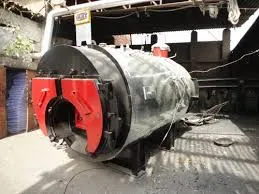
Nov . 08, 2024 10:58 Back to list
Coal-Fired Thermal Oil Boiler for Efficient Energy Production and Sustainable Heating Solutions
The Role of Coal-Fired Thermal Oil Boilers in Modern Industry
Coal-fired thermal oil boilers are crucial components in various industrial applications, providing an efficient means of heat transfer for processes that require high-temperature operations. As industries seek reliable and economical energy solutions, the importance of coal as a fuel source remains significant, despite the growing popularity of renewable energy sources. This article explores the design, operation, advantages, and challenges of coal-fired thermal oil boilers in today's industrial landscape.
Design and Operation
Thermal oil boilers differ from traditional steam boilers in that they use thermal oil (or heat transfer fluid) as a medium for heat transfer. This design allows for higher operating temperatures—often exceeding 300 degrees Celsius—without the high pressure associated with steam boilers. The key components of a coal-fired thermal oil boiler include the combustion chamber, heat exchanger, and thermal oil circulation system.
The operation begins with the combustion of coal in the boiler's furnace, where the heat generated is transferred to the thermal oil circulating through the heat exchanger. This oil then transports the heat to various industrial processes, such as chemical manufacturing, food processing, and textile production. The closed-loop system guarantees minimal energy loss and enhances efficiency.
Advantages of Coal-Fired Thermal Oil Boilers
1. High Efficiency Coal-fired thermal oil boilers can achieve efficiencies over 90%, particularly when equipped with modern combustion control systems. This efficiency leads to cost savings and reduced environmental impact due to lower fuel consumption.
2. Consistent Heat Supply These boilers provide a stable and reliable source of heat, which is critical for industries that require precise temperature control. The ability to maintain consistent temperatures ensures product quality and reduces downtime.
3. Flexibility Coal-fired thermal oil boilers can accommodate various coal grades, including low-quality lignite and high-quality anthracite. This flexibility allows industries to optimize fuel costs according to market conditions.
4. Environmental Compliance Modern coal-fired boilers are designed with advanced emissions control technologies to comply with stringent environmental regulations. Filter systems and scrubbers help reduce harmful emissions, making them more environmentally friendly than older models.
coal fired thermal oil boiler

Challenges and Considerations
Despite their advantages, coal-fired thermal oil boilers face several challenges.
1. Environmental Concerns Coal combustion releases greenhouse gases and pollutants. Although modern technologies have mitigated many of these issues, companies must remain vigilant in monitoring and adhering to changing regulations.
2. Public Perception As society shifts toward renewable energy sources, coal-fired systems may face backlash. Businesses utilizing these boilers must engage in transparent communication about their efforts toward sustainability and emission reductions.
3. Fuel Supply Risks The fluctuation in coal prices and availability can impact operational costs. Companies must establish reliable supply chains to minimize risks associated with fuel procurement.
4. Maintenance and Operational Costs While coal-fired thermal oil boilers have advantages, they also require regular maintenance and skilled personnel to operate efficiently. This can add to overall operational costs.
The Future of Coal-Fired Thermal Oil Boilers
As industries strive for greater energy efficiency and reduced emissions, coal-fired thermal oil boilers will continue to evolve. Technological advances, such as carbon capture and storage (CCS) and improved boiler designs, could provide pathways for their sustainable use. Additionally, integrating hybrid systems that utilize both coal and renewable energy sources can enhance flexibility and resilience in energy sourcing.
In conclusion, coal-fired thermal oil boilers play a vital role in many industrial processes by providing efficient and reliable heat transfer. While they face environmental and operational challenges, ongoing innovations and a commitment to sustainable practices can help these systems remain relevant in a rapidly changing energy landscape. As industries balance economic and environmental priorities, coal-fired thermal oil boilers will remain an essential component of industrial heating solutions for the foreseeable future.
-
High-Efficiency Commercial Oil Fired Steam Boiler for Industry
NewsJul.30,2025
-
High-Efficiency Biomass Fired Thermal Oil Boiler Solutions
NewsJul.30,2025
-
High Efficiency Gas Fired Thermal Oil Boiler for Industrial Heating
NewsJul.29,2025
-
High-Efficiency Gas Fired Hot Water Boiler for Sale – Reliable & Affordable
NewsJul.29,2025
-
High Efficiency Biomass Fired Hot Water Boiler for Industrial and Commercial Use
NewsJul.29,2025
-
High-Efficiency Biomass Fired Hot Water Boiler for Industrial Use
NewsJul.28,2025
Related PRODUCTS






















